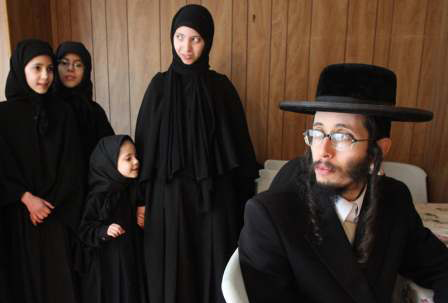In 2014 the Business Insider released an article about the most difficult to learn languages. Arabic gained the top position, having a complicated language structure and the highest numbers of word with variative and multiple meanings. I learned Arabic ever since I was a child. From madrasah diniyyah (eementary) up to the Yellow Book during Aliyah (high school) in the Islamic school, even until now, I still haven’t quite grasp the language which is the medium of the Holy Quraan. To they who want to seriously learning Islam, learning Arabic first is a must.
The process of studying and learning Arabic is long and complicated, being graded into several level. That is why it’s not easy to be an Arabic language expert, much less to be a Quraanic exegesis, when one’s need to understand not only textual and grammatical Arabic, but also the context (asbabun nuzul and asbabul wurud), plus had already finished studying the tafsir from the predecessors. But it’s not necessary to be an expert in Arabic to merely see that the case of Agnez Mo—the singer wore an outfit with an Arabic inscription that read “al muttahidah” in a concert on one tv station—as a blasphemy, much less a blasphemy to Islam.
The Arabic word Ms Mo was wearing meant “unity” or “union”, and I failed to see the urgency to consider it as something to be alarmed of. According to the KBBI (Kamus Besar Bahasa Indonesia, the Great Dictionary of Bahasa Indonesia), the definition of blasphemy or harassment is “to look down (on something); humiliating; ignoring.” Now the BIG question is, related to the word “unity or union” worn by Ms Mo, who would felt being looked down upon? Who would felt humiliated and ignored?
Following the heated discussion in the social media related to this case, we can see that those who thought Ms Mo’s case as a blasphemy tend to understand very little of the Arab language. This could be merely an assumption, but a simple understanding of the word would bring people to a normal, ordinary reaction. The word on Ms Mo’s clothes is not taken from a verse from the Holy Quraan, not even the phrase of “alhamdulillaah” (Praise be to Allah) like they were bickering about.
Islam IS NOT Arab
It is true that in the first place Islam came from the Arabian Peninsula, and using Arabic as its medium. But it needs our attention that not everything that is related to Arab language or culture is a part of Islam. As Muslims, we should know how to separate these things and use an unclouded, healthy logic to analyze it. The “pribumisasi Islam” or “making indigenous Islam” concept launched by Gus Dur since the eighties is a response to the Arabisation pattern beginning to spread in our society. And lately in this internet era the same symptoms begin to infect our cyber-conscious Muslims.
In his dissertation Identitas dan Kenikmatan (Identity and Pleasure) (2015), Ariel Haryanto saw that pattern as the form of “Muslim’s identity hesitation”, almost exclusive of those urban people. Ariel named it as “post Islamism”, politically and culturally. As a concept, post Islamism means the emergence or recurrence of Arabic cultural symbols as the representation of Islam. Politically post Islamism could only make maneuvers in the Middle East and find it difficult to enter Indonesia, but culturally the development is quite significant.
Prove of the emergence of this pattern could be seen in the now-flourishing popular culture. We can derive the examples from gimmicks of ustadz on the television who are pictured as beautiful people, or the artists using Arabic cultural imagges e.g gamis (long robes) or other Arabic-induced things asa representation of their beliefs.
These pop-culture icons would certainly influence the society and help shaping the pop cuture. My concern is that these “Islamic imagery” are not a part of Islam and could be just a small part of Arab culture. A culture that is warpped in an industrial or fashion pattern, making Islam just a comodity, thus belittle its greatness.
Easily-startled Muslims
I don’t know just exactly when did this term began to take place in the society, but I agreed that this is the right term to call fellow Muslims who are easily startled by almost every itsy bitsy things, especially when it comes to a phenomenon beyond their understandings.
In one occasion Gus Mus (KH Mustofa Bisri) of PP (Pondok Pesantren, Islamic schools) Raudlatut Thalibin Rembang, warned us of the dangers of being an easily startled Muslim. One characteristic of people with lack of knowledge is “they easily get startled. The charecteristics of people with vast knowledge (nyegoro, from Javanese “segoro”, means “the ocean”) is that they are not easily startled. Comes the Shiite, they got startled. Comes the Ahmadiya, they got startled,” he said in the day-7 death commemoration of KH Sahal Mahfudz in Kajen, Pati, Central Java on January 28, 2016.
Knowledge gives us the appropriate point of view on everything. Our mind would be able to see things not in black-and-white tones. There would always be a room in one’s head for negotiation and verification if he has enough knowledge on everything, or even if he didn’t he would constantly seeking (for that knowledge). Including for all matters beyond hisself.
It’s a big mistake to stop learning and seeking, then hastily justified and labelled something beyond our knowledge. This could be worse when we were just following or copying what others had to say. Ms Mo’s case with her Arabic printed shirt of al muttahidah would repeat itself again in the same pattern.
This repetition of cases is actually pathetic since the gates of learning Islam is very easy to open in this cyber era. The only caution is just we need to be conscientious upon picking the source of learning. Otherwise we can easily tripped to calling someone doing blasphemy again.
And do not forget the roar caused by the using of Javanese langgam (song, musical tone) in reciting the Quraan, which was addressed as a form of blasphemy, too; while in fact the ulama allowed it. Or let us see the case of the Copt Christians of Egypt. Is it wrong for them to recite the Bible in Arabic, while in everyday life it is Arabic language that they use, and moreover they live in an Arabic-speaking country? Anyone with sane mind will refuse to say that it’s a harrassment!
Gus Dur said that his best teacher is reality. This is something that we all could learn. From reality we could understand the pattern occurs in our society, which easily follow one current without bothering to check on the source first. We are not alone in this society, there are so many types of human, there are many other beliefs and religions.
In this era of information filling our backyard like a flood, as Muslims we need to be conscientious in receiving and separating everything. If we are not careful, we could be easily adrift in the current and become an easily-startled Muslim. Are you like that? I hope not.
By: Dedik Priyanto, alumni of Islamic School Attanwir, Bojonegoro
![Islami[dot]co](https://en.islami.co/wp-content/themes/jambualas/images/logo.png)


